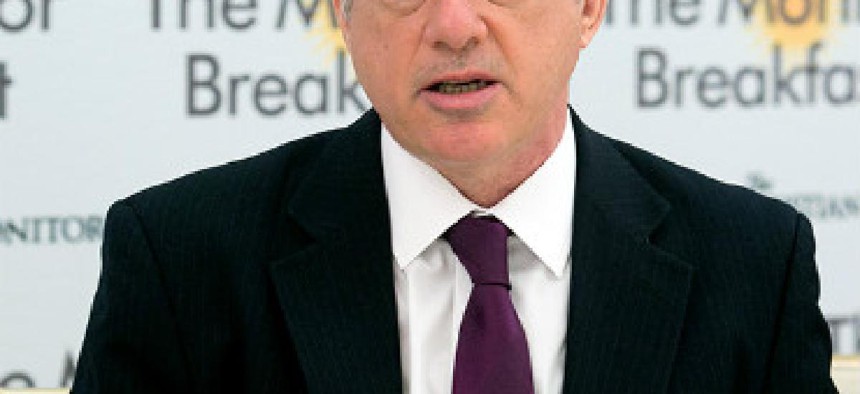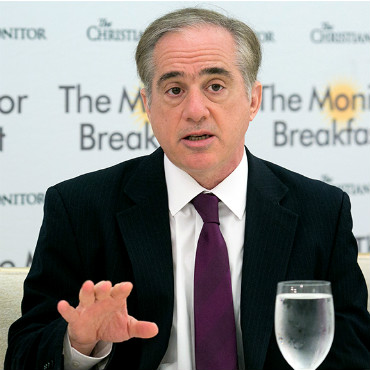VA chief: fast firing authority will improve morale

President Trump is expected to sign a bill granting new authority to fire and discipline VA employees on an expedited basis. Secretary David Shulkin thinks the measure will help improve flagging morale at the agency.

VA Secretary Dr. David Shulkin. (Photo credit: Michael Bonfigli/Christian Science Monitor)
On June 23, President Donald Trump is scheduled to sign a bill giving the Secretary of Veterans Affairs new authority to fire and discipline employees on an expedited basis. VA Secretary David Shulkin thinks the measure will help improve flagging morale at the agency.
"When you've been doing something for years and it's not working, you can either continue to follow the same exact path or you seek change. I am seeking change, and I desperately need that change," Shulkin said at a June 20 event with reporters hosted by the Christian Science Monitor.
The Department of Veterans Affairs Accountability and Whistleblower Protection Act, which passed both houses of Congress, gives the VA chief new power to suspend or sack employees over allegations of misconduct or poor performance, and shifts the appeals process for senior executives from the Merit Service Protection Board to an in-house review panel at VA.
"This is going to dramatically improve morale not hurt morale," Shulkin told reporters.
"There is nothing more demoralizing than being in an organization, working alongside people that everybody knows no longer shares the values, morals and ethics of the vast majority of people who go to work every day for the right reasons," Shulkin said.
He argued that the VA is competing for talent not with other government agencies with stronger civil service protections, but with private sector health organizations where the government's rules of the road don't apply.
Shulkin noted that disciplinary processes can take years to conclude, and he complained specifically that the "MSPB would bring back people that a reasonable manager in the private sector would not have to deal with."
At the same time, Shulkin does not see the new authority as a potential threat to the VA's workforce of more than 350,000 career feds.
"I do not see this is as a tool that's going to lead to mass firings. I would never support that," Shulkin said. "It's going to be used on a small number of people who clearly have deviated from accepted practices and norms."
Senior Executives Association President Bill Valdez opposed the bill, warning in a June 7 letter that the change of civil service protections and MSPB appeals could lead to "a return to the spoils system of patronage that was a hallmark of the federal civilian workforce prior to the passage of the Pendleton Act of 1883, and it’s modernizing legislation the Civil Service Reform Act of 1978."
Federal employee unions have also spoken out against the bill. J. David Cox, Sr., national president of the American Federation of Government Employees, told a Senate panel in May that there were already the necessary tools at hand to dole out discipline to problem employees.
"When poor performers are not dealt with it is not because the civil service laws or procedures are too difficult to utilize. It is because managers do not want to put forward the effort to properly document poor performance so that they can remove or demote these people," Cox said.
From Obama to Trump
Shulkin is a rarity in the Trump administration -- a politically appointed holdover from the Obama team. Shulkin credited his predecessor Robert MacDonald, whom Shulkin served as deputy secretary for health, was on the right track and made positive changes, but his experience led him to conclude that "slow, incremental steady change isn't what [VA] needs."
The current president, Shulkin said, "very much looks at this organization like running a business, and he understands that you need to allow the manager of the business to have the freedom to go out and challenge assumptions and to make decisions. And I have found that mandate from him to get this organization fixed and the support and freedom to challenge the old assumptions -- that's exactly what VA needs right now."
Trump, said Shulkin, "came in to set a fundamentally different course correction when it comes to providing services to veterans," and he plans to stock VA with leaders who reflect this.
"I'm looking for a different type of leadership style from people in my organization," he said. "Inherently, that's going to be associated with taking risks. I'm going to support that as long as it's measured, and we can turn it when we need to adjust course on these decisions. Acting quicker and more decisively is part of that management style."



